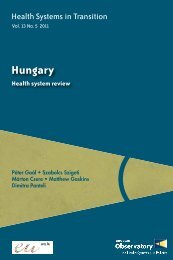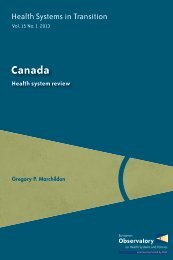Review of Current Evidence and Comparison of Guidelines for ...
Review of Current Evidence and Comparison of Guidelines for ...
Review of Current Evidence and Comparison of Guidelines for ...
You also want an ePaper? Increase the reach of your titles
YUMPU automatically turns print PDFs into web optimized ePapers that Google loves.
EUR/03/5045931<br />
page 9<br />
current treatment is adequate. The difficulty in interpreting evidence in HIV positive patients is<br />
compounded by the fact that many patients may currently be receiving anti-retroviral therapy,<br />
thereby boosting their immune systems. However, it is not known what will happen to those<br />
patients in the long term if they fail on their anti-retroviral treatments <strong>and</strong> have a reduction in<br />
their CD4 counts.<br />
This new evidence looking at HIV <strong>and</strong> syphilis co-infection has led to many <strong>of</strong> the conclusions<br />
about treatment regimes in all stages <strong>of</strong> disease, both in HIV positive <strong>and</strong> negative patients. In<br />
the main, the guidelines propose that treatment <strong>for</strong> syphilis in patients with HIV should be no<br />
different from guidelines in HIV negative patients. Specific differences in treatment are as<br />
follows; the CDC guidelines suggest a possible three dose <strong>of</strong> benzathine penicillin at day 1, day<br />
8 <strong>and</strong> day 15 in early syphilis. Due to concern about higher levels <strong>of</strong> asymptomatic neurosyphilis<br />
in HIV positive patients (Rolfs study found a higher level <strong>of</strong> CSF changes in the HIV positive<br />
group) CDC recommends the examination <strong>of</strong> CSF in all HIV positive individuals with late<br />
syphilis <strong>and</strong> consideration <strong>of</strong> this in early syphilis. United Kingdom guidelines propose treating<br />
all HIV positive patients with treatment <strong>for</strong> neurosyphilis. CSF examination is advisable in all<br />
HIV positive patients in the European guidelines; otherwise treatment is the same as <strong>for</strong> HIV<br />
negative patients. There are no specific guidelines <strong>for</strong> the treatment <strong>of</strong> HIV/syphilis co-infected<br />
patients in Russian Federation.<br />
It is recommended in all guidelines that all patients who are diagnosed with syphilis should be<br />
tested <strong>for</strong> HIV.<br />
Syphilis in Pregnancy<br />
To add to a complex situation in terms <strong>of</strong> pathogenesis <strong>and</strong> treatment <strong>of</strong> syphilis, the challenge in<br />
pregnancy is finding treatment which will treat the mother adequately, while not harming the<br />
fetus, <strong>and</strong> either treat or prevent infection in the fetus. A recent Cochrane review has looked at<br />
the various regimes used (100). Singh <strong>and</strong> McCloskey have written a review article on syphilis<br />
in pregnancy that also mentions Australian guidelines (101). As in other areas <strong>of</strong> syphilis<br />
management there has been no comparison made about the relative efficacy <strong>of</strong> different<br />
penicillins (5).<br />
The CDC guidelines recommend using the same regimes as <strong>for</strong> the relevant stage <strong>of</strong> syphilis as<br />
in non-pregnant patients but with a possible second dose at day 8 <strong>for</strong> BBP in early syphilis (5).<br />
This is based on research showing that due to physiological changes in pregnancy a single IM<br />
dose <strong>of</strong> 2.4 mu benzathine penicillin remains at treponemicidal levels (>0.018 µg/ml) in serum<br />
<strong>for</strong> three times longer in non-pregnant than pregnant women (102). Watson-Jones et al.<br />
completed a prospective cohort trial <strong>of</strong> 1688 pregnant women in Tanzania (103). A total <strong>of</strong> 382<br />
women with positive syphilis serology were given a single dose <strong>of</strong> BBP (2.4mu IM). This<br />
showed no increased risk <strong>of</strong> adverse pregnancy outcome <strong>for</strong> women with positive syphilis<br />
serology treated with BBP compared with 950 seronegative women. Stillbirth rate was 2.3% in<br />
seropositive treated women <strong>and</strong> 2.5% in seronegative women. Low-birth-weight live births were<br />
6.3% in seropositive treated women <strong>and</strong> 9.2% in seronegative women. Alex<strong>and</strong>er <strong>and</strong> colleagues<br />
followed CDC guidelines (i.e. single dose BBP) in 448 pregnant women with early syphilis, with<br />
a success rate <strong>of</strong> 98.2% in preventing congenital syphilis (104). However, a study in Africa<br />
found if two doses <strong>of</strong> BBP one week apart were used in pregnant women with early syphilis<br />
there were lower rates <strong>of</strong> congenital syphilis <strong>and</strong> infant mortality, with higher birth weights (25).<br />
A PBP regime is recommended in the United Kingdom guidelines reflecting concern over

















